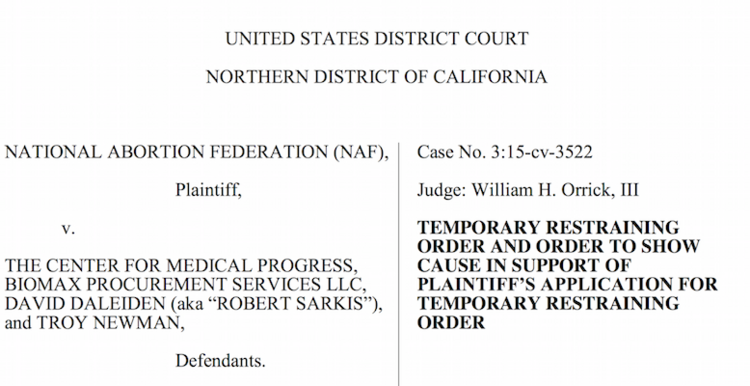Regardless of the possible criminal behavior of abortion and medical tissue providers, or the moral and ethical issues surrounding surreptitious videotaping for journalistic purposes, the legal issues presented by the release of these videos involve a complicated mix of federal and state law. The First Amendment to the U.S. Constitution governs the relationship between the government and the people and prohibits the government from “abridging the freedom of speech, or of the press.”
Despite this broad language, the U.S. Supreme Court has held that certain types of speech may be abridged. “Fighting words” that incite immediate violence, fraudulent advertising, and copyright infringement are illegal, for example. In addition, most states, including California, where videos were recorded at the 2013 National Abortion Federation conference, and Maryland, where the 2014 conference took place, prohibit invasion of privacy and generally will enforce nondisclosure agreements, such as those signed by agents of the Center for Medical Progress. Nevertheless, whenever a court determines that the application of a federal or state law conflicts with the First Amendment, the First Amendment prevails and the speech is permitted. It is not always easy, however, for judges to determine the exact point at which enforceable privacy and contractual rights end and First Amendment protections begin.
In the current dispute, N.A.F. brought suit in federal court and StemExpress, a medical tissue provider, went to California state court, to ask for temporary restraining orders (T.R.O.’s) to stop additional revelations. The judges in each case had to balance not only the rights of both sides, but the physical risks as well. First Amendment jurisprudence frowns upon any exercise of prior restraint on free speech and limits its use to extreme cases, but both courts found the requirements for a T.R.O. were met. The federal judge relied on the nondisclosure agreement and the fear that further revelations may put the safety of recorded individuals at serious risk. (Neither T.R.O. specifically covers recordings made with other groups at other venues, such as Planned Parenthood sites).
T.R.O.’s are short-lived versions of preliminary injunctions issued by courts to prevent harm while cases move at glacial pace through the halls of our judicial system. Hearings have been scheduled in both courts for late August to determine whether the bans should stay in effect. While the issuance of these T.R.O.'s does make it more likely preliminary injunctions will be granted, that result is not certain. Constitutional rights are not easily contracted away and freedom of the press is given the highest deference by our courts. It is very possible both the state and federal court judges will lift the prohibitions on additional disclosures once they have more time to carefully consider the facts and law. If they do not, the injunctions can be appealed, potentially all the way to the U.S. Supreme Court.
Ellen K. Boegel, an associate professor of legal studies at St. John’s University in New York, clerked for the United States Court of Appeals for the Second Circuit.








